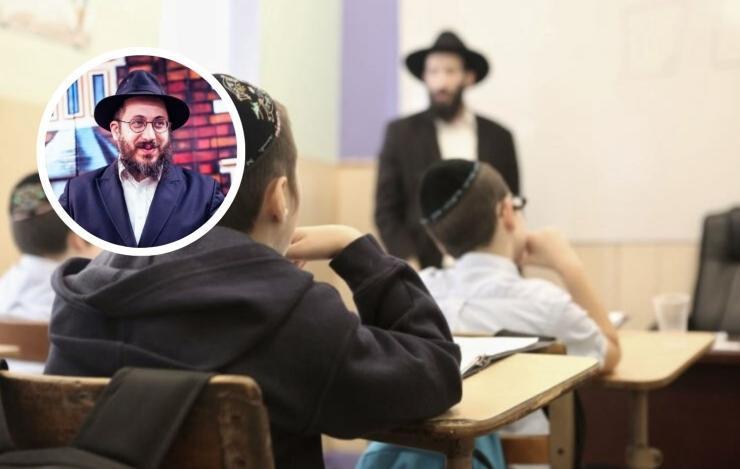No To Skipping Parts of Davening
I am a teacher in a Chabad Cheder and I am in charge of the daily Shacharis minyan. I am challenged as to what is the best Chinuch approach to employ towards talmidim that come late to davening. Should I tell them, as the Shulchan Aruch says, to skip parts of davening so that they can daven Shmoneh Esreh with the minyan, or should I encourage them to daven the full davening? • Rabbi Gershon Avtzon answers in this week’s Chinuch and Moshiach column • Full Article
By Rabbi Gershon Avtzon
Question: I am a teacher in a Chabad Cheder and I am in charge of the daily Shacharis minyan. I am challenged as to what is the best Chinuch approach to employ towards talmidim that come late to davening. Should I tell them, as the Shulchan Aruch says, to skip parts of davening so that they can daven Shmoneh Esreh with the minyan, or should I encourage them to daven the full davening?
Answer: It is fascinating that this exact question was written to the Rebbe in 5713 (1953) by Rabbi Yitzchak Dubov A”H. Rabbi Dubov, a respected Chabad Chassid and rav on Anash in Manchester England, assumed the role of a mashgiach in the Manchester Yeshiva, a Litvisher yeshiva in the city. Reb Yitzchak didn’t allow his role to remain in the realm of nigleh. He constantly utilized his relationships with the bochurim to teach them Chassidus and to connect them with the Rebbe. He maintained a daily shiur Tanya with the bochurim, and used every opportunity to teach them messages of Chassidus.
The Students Should Remain Unaware of this ‘Heter’
As the mashgiach, he was faced with this specific dilemma. He wrote about it to the Rebbe and received the following answer:
(1) “It is known what Chazal (In Pirkei Avos) teach us: that a wise man looks towards the future. This motto applies in all cases including your present dilemma. As such: Even though there are clear halachic sources that rule that in this particular instance one should skip part of davening (to be with the tzibbur), it is important to foresee the results of such action in the future growth and development of the talmid.”
“We have all clearly seen that this ‘heter‘ to skip part of davening, causes people — that have now learned that they can skip parts of davening — to lose respect for the general concept of davening. They first start skipping korbanos, then P
Pesukei d’zimarah, etc.
“Thus, to address your question of how you should practically educate: even though it is obviously not correct to rule publicly against a din, you should do your utmost that the students remain unaware of this ‘heter‘ to skip parts of davening. This is similar to the halacha in regards to Pikuach Nefesh in which we tell a person to desecrate one Shabbos so that they can keep all the upcoming Shabbassos.” (Igros, Vol. 7 p. 139; #1998).
The Role of a Mashgiach in Yeshiva
(2) As you are the mashgiach for davening, I feel it beneficial to share the following letter in which the Rebbe describes the idea goal of a person in such a position:
“Regarding yourself: You should work hard so that within a short amount of time all those who are under your care and direction should daven with excitement and speak about Yiddishkeit with excitement. This will create an effect on those around them including the students that enter the institution at a later date.” (Igros, Vol. 18 p. 190; #6693)
Give The Students Leadership Roles
(3) On a similar note: In 5721 (1961), a young teacher wrote to the Rebbe about some of the issues she was having in managing her classroom during davening time. The Rebbe responded with this piece of advice:
“We clearly see that things improve when you appoint the children themselves to be part of the management of davening through helping out with distributing the siddurim (similar to the role of the gabbai and shamash in shul). The improvement of behavior is not just during davening, but also before and after davening.
The Rebbe adds the following advice on the implementation: “It is also self-understood that it is a good idea to have a rotation of these responsibilities from amongst the students in intervals that are fitting with their abilities.” (Igros, Vol. 20 p. 42; #7487)
The Moshiach Connection:
In 5752 (1992), the Rebbe spoke about the importance of davening for Moshiach and that the davening should be with a sense of joy. In the words of the Rebbe (Beshalach 5752):
“This applies particularly to davening for the true and complete Redemption, specifically after the declaration of my sainted father-in-law, the leader of our generation, that ‘all the appointed times have passed already,’ and all aspects of Divine service have been completed.”
“In addition to the desire, longing and yearning for the Geulah (until now), there must now also be an essential feeling of joy, borne out of the realization that the Geulah is actually coming at this actual moment.”
111
Join ChabadInfo's News Roundup and alerts for the HOTTEST Chabad news and updates!











































